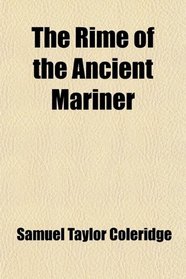THIS IS A CLASSICS ILLUSTRATED **GRAPHIC NOVEL** VERSION OF THIS POEM.
Search -
The Rime of the Ancient Mariner
The Rime of the Ancient Mariner
Author:
Purchase of this book includes free trial access to www.million-books.com where you can read more than a million books for free. This is an OCR edition with typos. Excerpt from book: NOTES. Rime. The derivation (Anglo-Saxon, r?m; Middle English, rime) shows this spelling to be correct rather than the ordinary form, rhyme, which is the resu... more »
Author:
Purchase of this book includes free trial access to www.million-books.com where you can read more than a million books for free. This is an OCR edition with typos. Excerpt from book: NOTES. Rime. The derivation (Anglo-Saxon, r?m; Middle English, rime) shows this spelling to be correct rather than the ordinary form, rhyme, which is the resu... more »
ISBN-13: 9780217105514
ISBN-10: 0217105513
Publication Date: 8/8/2009
Pages: 60
Rating: ?
ISBN-10: 0217105513
Publication Date: 8/8/2009
Pages: 60
Rating: ?
0 stars, based on 0 rating
Publisher: General Books LLC
Book Type: Paperback
Other Versions: Hardcover, Audio Cassette, Audio CD
Members Wishing: 0
Reviews: Member | Amazon | Write a Review
Book Type: Paperback
Other Versions: Hardcover, Audio Cassette, Audio CD
Members Wishing: 0
Reviews: Member | Amazon | Write a Review




